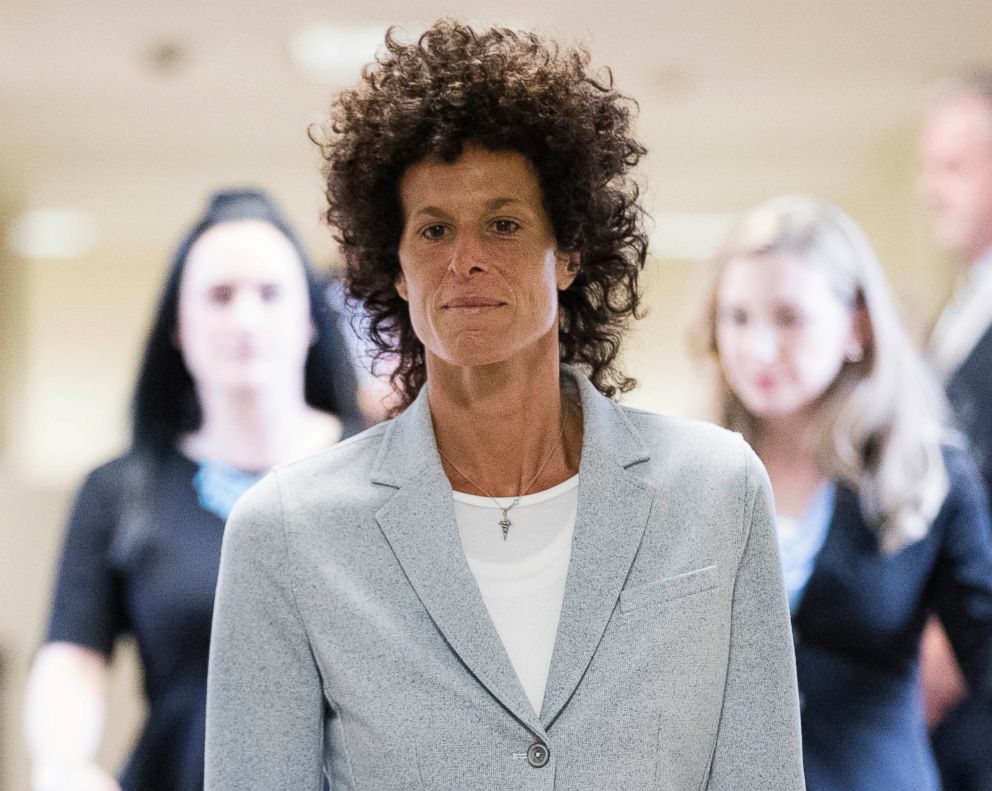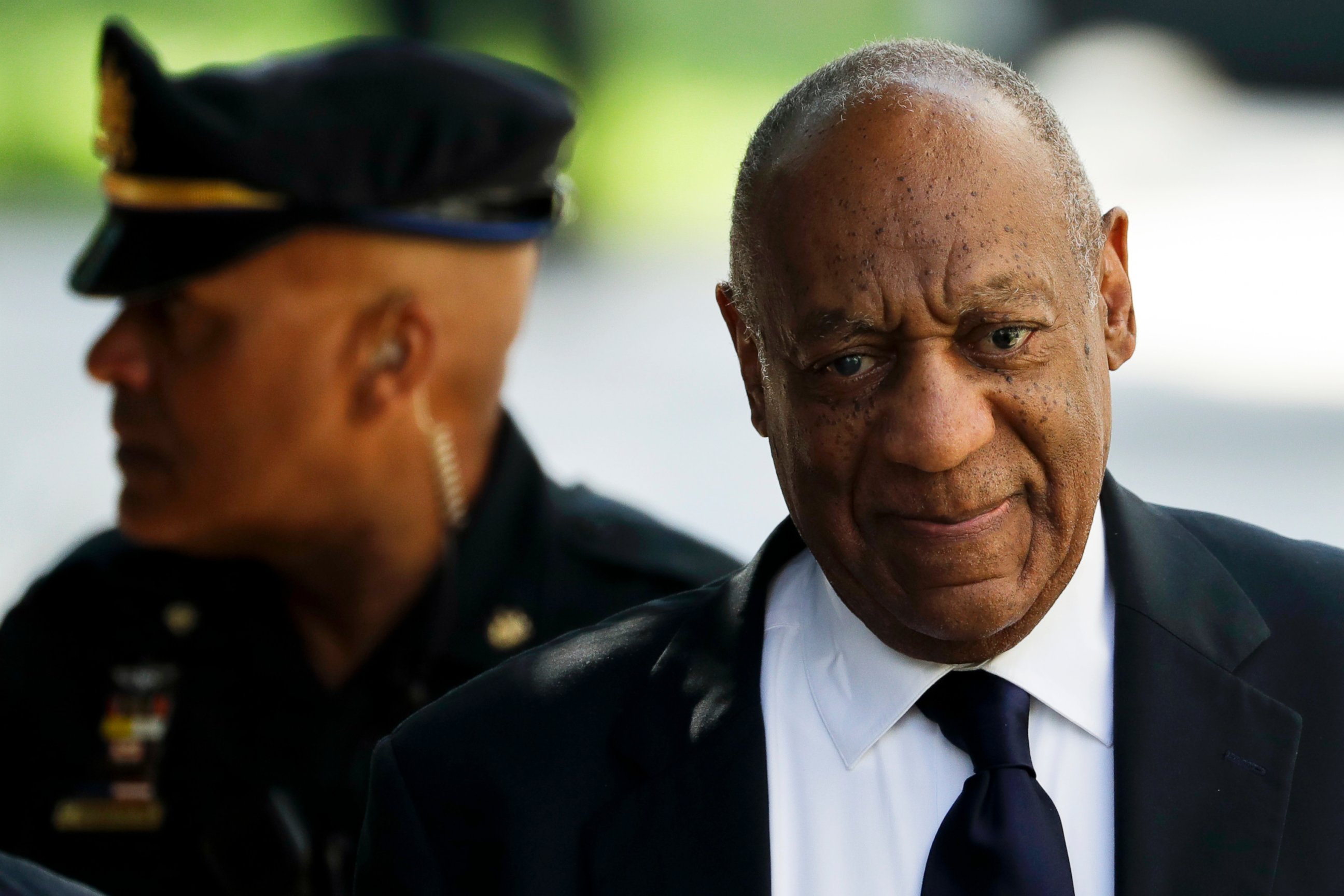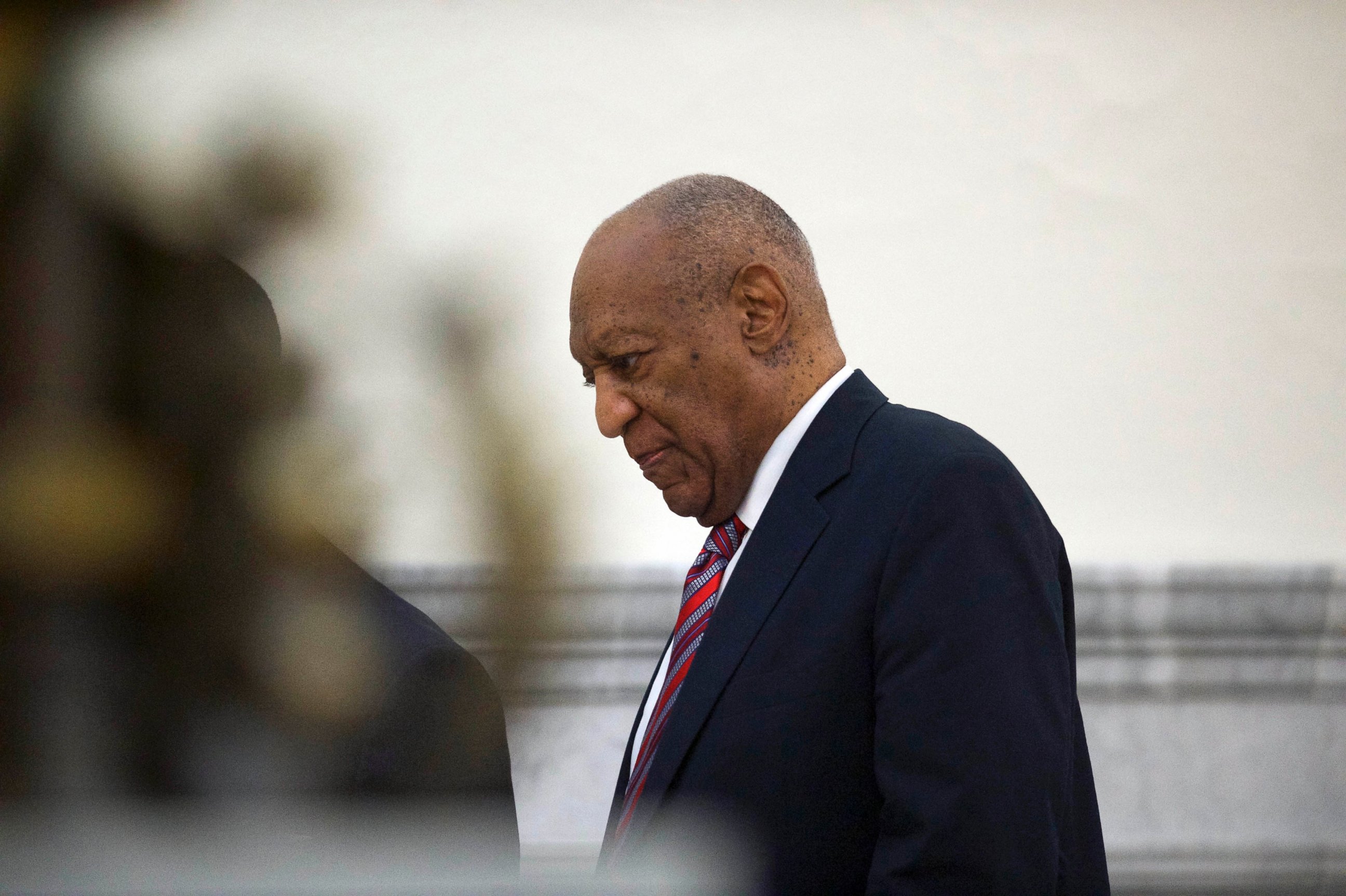Bill Cosby's fate could turn on a pivotal court decision expected next week
Prosecutors want to demonstrate for the jury a specific pattern of behavior
— -- The Pennsylvania judge at the center of the criminal retrial of comedian Bill Cosby on sexual assault charges could rule as soon as early next week on a critical motion that may reshape the Commonwealth’s case as it heads into jury selection later this month.
Montgomery County Judge Steven T. O’Neill, who presided over Cosby’s first trial -- which ended last summer in a hung jury -- is expected to make a pivotal decision after hearing opposing arguments in pretrial hearings on Monday and Tuesday on whether to allow some of the more than 50 women who have accused Cosby of sexual assault to testify.
Prosecutors want to demonstrate for the jury a specific pattern of behavior that they believe underscores the similarities between nearly all of the dozens of accusers and the allegations of the primary accuser in the case, Andrea Constand.

"I think the outcome [of the case] virtually turns on that ruling," said Yale Law School professor Steven B. Duke.
The decision facing O’Neill is an especially thorny one given the nature of the Cosby case and the extraordinary speed and strength with which the #MeToo movement against sexual mistreatment of women is reshaping American patriarchal culture.
The judge ultimately must weigh the value to the jury of hearing additional evidence from other accusers with very similar accounts of being drugged and abused, versus the potential negative cumulative effect such new witnesses could have on the defendant.
O’Neill can issue his ruling directly from the bench, or take it under advisement and issue a written ruling after the pretrial hearings.
Prior to the first trial, prosecutors had petitioned O’Neill to allow 13 additional accusers to take the stand and testify about being drugged and sexually assaulted by the famed comedian -- stories strikingly similar to allegations made by Constand, who alleges that Cosby drugged and sexually assaulted her while she was unconscious at his home in 2004.
The prosecutors have said in court papers that they were trying to demonstrate that Cosby has a specific modus operandi, or a common scheme or plan, in allegedly repeatedly drugging and abusing the women.
Instead, the judge allowed one additional accuser, Kelly Johnson, to testify.
Now he is being asked to reconsider the decision, in light of a recent appellate court ruling, and allow as many as 19 additional accusers to tell their stories on the stand.
I’m sure he would say, 'I’m just going call it the way I see it and not worry about appeal.' They all say that.
"Shooting Fish in a Barrel"
O’Neill’s anticipated ruling could be the most consequential of the entire trial.
"It was the most important ruling in the first trial, and it’s going to be the most important in the second trial," said Steve Fairlie, a former Montgomery County prosecutor with experience trying high-profile cases.
"If he allows 19 other witnesses to say they were sexually assaulted using the same modus operandi as Andrea Constand, it’s going to be like shooting fish in a barrel for the prosecution, and if he excludes [the additional witnesses], it’s going to be hard to get a conviction," Fairlie said.
Philadelphia criminal defense attorney Mark B. Sheppard concurred.
"It’s the whole case," said Sheppard, president of the Pennsylvania Associations of Criminal Defense Attorneys. Sheppard stressed that he was speaking solely for himself, not as an officer of the organization.
He said that it’s especially tricky rulings like this one that weigh heaviest on criminal court judges.
"It is a very difficult decision, no matter what anybody says, and no matter what limiting instruction you give to the jury, if that evidence comes in, then he gets convicted," Sheppard said. "In this hyper-partisan and raw environment, how hard is it for a judge to make a decision like this? I think it’s exceedingly difficult."
The "Doctrine of Chances"
Normally, prosecutors cannot introduce evidence of prior bad conduct from other cases because it could be prejudicial in the eyes of the jury. But under Pennsylvania law, exceptions can be made if such evidence establishes a modus operandi, or common scheme to each alleged assault.
Prosecutors also cited two other exceptions: the so-called absence of mistake, which in this case posits that the defendant had to know his alleged victims were drugged and couldn’t consent to sexual activity because he had committed the same act before, and the legal 'doctrine of chances,' which asserts that the more accusers that come forward, the less chance they are all lying.
"This evidence is relevant to establish that an individual who, over the course of decades, intentionally intoxicated women in a signature fashion and then sexually assaulted them while they were incapacitated, could not have been mistaken about whether or not Ms. Constand was conscious enough to consent to the sexual contact," prosecutors said in the motion filed in January.
Defense attorneys have vigorously challenged the state’s motion, citing 34 cases as legal precedent and arguing that additional accusers don’t show a pattern of "prior bad acts," but rather a pattern of accusations. All of the more than 50 women that have been interviewed by prosecutors came forward after Constand first told her story to authorities in 2005. All of the women’s allegations -- except for Constand’s -- fall outside the statute of limitations and cannot be prosecuted.
In a 2005 deposition, Cosby admitted to having sex with Constand, but said it was consensual. Cosby's lawyer, Martin D. Singer, released a lengthy statement in November 2014 after numerous women came forward with new sexual assault claims, saying, in part, "The new, never-before-heard claims from women who have come forward in the past two weeks with unsubstantiated, fantastical stories about things they say occurred 30, 40, or even 50 years ago have escalated far past the point of absurdity."
In their response to the prosecutor’s motion to include additional accusers, Cosby defense attorneys argued that the judge had already ruled on this issue -- allowing one of 13 additional accusers to testify.

"Yet the Commonwealth once again seeks to admit those same witnesses in addition to six new ones, to set up the impermissible and pernicious premise that Mr. Cosby supposedly ‘did it before’ and therefore he must have 'done it again,'" defense attorneys wrote in their opposition papers.
Spokespersons for both the defense and the prosecution declined to comment beyond what was already laid out in the two opposing briefs.
Sheppard also suggested that adding additional multiple witnesses could prove messy, in that it could dramatically expand the scope and length of the retrial and likely increase the odds that a conviction could be successfully appealed.
"One of the basic tenets of evidentiary relevance – as opposed to logical relevance – is that [supplementary bad acts evidence] is not going to mislead the jury, not going to open the door to a trial within a trial, is not going to get the jury and the court and the trial bogged down on collateral issues," he said.
"If I’m the defense lawyer, what I’m arguing here is that this will turn into 10 or 15 separate trials: we’re going to have end up trying to every single one of these allegations, where we haven’t had the full panoply of discovery, where we haven’t had the full panoply of due process.
"If the Commonwealth had the goods on this, and they wanted to bring in 16 victims, then they should have tried 16 cases," Sheppard said. "How does Cosby defend himself against these charges?"
For his part, Duke, from Yale Law School, said that a "proper result may be to let in one or two only. If he lets in 15 or 20, there’s no chance of an acquittal. It [would] overwhelm the case."
What’s more, Duke said of O’Neill, "he’s not going to completely reverse his decision and say, 'We’ll let them all in.'"
In their motion, prosecutors cited a fresh legal argument -- a Pennsylvania State Supreme Court decision issued last year after O’Neill’s ruling, that affirmed the so-called "doctrine of chances," which posits that the more times an action occurs, the less likely that it is an accident. In that case, a majority opinion found that "doctrine of chances" evidence was admissible.
Quoting guidance from a renowned legal scholar, University of California Davis Law School professor Edward J. Imwinkelried, the justices, in one concurring opinion, outlined three criteria with which to admit or reject such evidence.
"First, is the evidence of other acts roughly similar to the charged crime?" the majority opinion reads. "Second, does the number of unusual occurrences in which the defendant has been involved exceed the frequency rate for the general population? Third, is there a real dispute between the prosecution and the defense over whether the [charged crime] occurred?"
But at least two of the justices wrote dissenting opinions, potentially weakening its strength as case law - and some legal experts question whether the ruling provides sufficient clarity for the state’s judiciary.
"There is this intervening decision by the Pennsylvania Supreme Court, but the court was very deeply split," said University of Pennsylvania law professor David Rudovsky. "So even with that decision, I don’t think there’s any clear path."
Rudovsky said O’Neill is facing what he called "a pretty crucial decision."
Imwinkelried himself thinks the judge will channel the Biblical character Solomon, who, when faced with two women who were both claiming the same child as theirs, ultimately decided to literally "split the baby."
"I can ... see why the judge would be so careful. This is a really high-profile case, it’s a very important ruling and one of the things judges often do in the cases like this is to strike a Solomonian pose and split the decision: some to you and some to you," he said. "That sends a signal to the appellate court that the judge used discriminating judgment in determining how much the prosecution needed in its case, and in order to ensure that the judge exercised discrimination in his or her ruling."
He also took issue with the use of the common scheme or plan theory, also called the modus operandi, or M.O. for short.
"Modus operandi is the theory that a particular person uses a singular, distinct, one of kind method of committing a crime and another act shares the M.O. and strengthens the inferences of the defendant’s identification as the perpetrator.
"But it’s not an M.O. issue here -- it’s not Cosby saying someone else did it. It’s a denial that there was an act to begin with."
Fairlie, the former prosecutor, said O’Neill would likely face increased judicial scrutiny were he to veer from his original ruling, which allowed one additional accuser to testify.
"The judge already made this decision in this case," said Fairlie. "He is not supposed to revisit a decision that he has already made in the case. The only possible exception is that the [appellate] decision came down after his ruling. If it’s based on new law that’s come down, it would be appropriate [for O’Neill] to revisit the decision, but [the appellate ruling] is far from clear -- the justices could not agree amongst each other," he said.
"So I don’t know how that could provide clear guidance to Judge O’Neill."
"Very different circumstances"
Unlike many state laws, federal rules of evidence do allow for "prior bad acts" witnesses in sexual assault cases, said University of Colorado law professor Aya Gruber, a former defense attorney.
"If this were a federal case, all the previous sex assaults could come into the case."
Even so, she said, courts are more likely to allow new evidence that demonstrates a behavioral pattern when it comes to cases involving sexual violence.
"From what I’ve noticed, when it comes to sex assaults, courts are willing to be less a stickler on the ban on propensity evidence, also called character evidence."
Gruber said that she expects that O’Neill will ultimately allow some of the other accusers to testify.
"It sounds very anti-judge, but the reality of the situation -- in the face of the #MeToo movement, and especially now in the face of [convicted former Team USA gymnastics doctor] Larry Nassar, there’s a very strong court of public opinion now," Gruber said.
"In terms of not letting in willing prior witnesses with very similar testimony, I’ve got to think the court is now operating under very different circumstances that are likely going to allow additional [accusers] to testify."

A veteran former Pennsylvania prosecutor and judge who knows O’Neill and sought anonymity from ABC News in return for speaking frankly, said he also believes the judge will allow additional accusers to testify, but for different reasons.
"A lot of judges see their primary responsibility as protecting the people from crime, and I can understand that. I’m more of a constitutionalist, and I’m not saying either position is right. But I think because of it he’s going to let some of [the additional accusers] in," he said, referring to a parade of dozens of women who collectively accuse Cosby of a spectrum of sexual violence over decades, stretching from sexual misconduct and inappropriate touching to rape.
Appeals court scrutiny
Gruber also noted the additional pressure that high-profile case rulings can put on lower court judges.
"Obviously, judges are going to follow the law," Gruber said. "But I also think that they’re going to be hyper-aware that this is a case in which every single ruling will not only be under appellate court scrutiny, but under public scrutiny."
Duke concurred.
"Any judge has got to be concerned about reversal on appeal, and particularly on a case of such notoriety as this one," the Yale Law School professor said. "But I’m sure he would say, 'I’m just going call it the way I see it and not worry about appeal.'
"They all say that."




